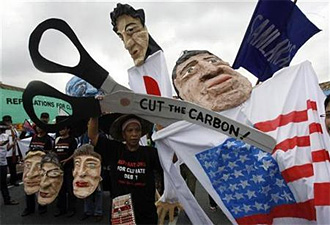
|  |  |  Editorials | Environmental | October 2009 Editorials | Environmental | October 2009  
Mexico Calls US a "Stumbling Block" in UN Climate Talks
 David Fogarty & Chisa Fujioka - Reuters David Fogarty & Chisa Fujioka - Reuters
go to original
October 07, 2009


| | An activist pretends to cut off the head of an effigy of U.S. President Barack Obama during a demonstration outside the United Nations Building in Bangkok, where talks on climate change are being held, October 5, 2009. (Reuters/Chaiwat Subprasom) |  |
Bangkok - The United States came under pressure to show leadership in U.N. climate talks on Wednesday with Mexico saying its neighbor is a stumbling block in efforts to try to craft a tough global climate agreement by December.

The United States has been criticized by developing countries and green groups in talks in the Thai capital for not being able to put a tough emissions reduction target for 2020 on the table, instead focusing on a 2050 target.

Developing nations also worry over Washington's position that any new climate pact should set legally binding domestic steps to cut emissions as a benchmark for global action to fight climate change.

"I think that they are in an uncomfortable position since they cannot put on the table any figures unless the Congress process is clearer," Fernando Tudela, head of the Mexican climate delegation in Bangkok, told Reuters in an interview.

"They are increasingly identified as a stumbling block for the negotiations and it's up to them to dispel this perception and to show the real leadership we're expecting from them."

A climate bill drafted by U.S. Senate Democrats aims for a 20 percent cut in greenhouse gas emissions by 2020 from 2005 levels. But President Barack Obama's administration says he is unlikely to sign the legislation before a major December conference in Copenhagen aimed at sealing a new climate pact.

The Senate bill target equates to a 7 percent cut on 1990 levels by 2020, far below the 25-40 percent cuts by then that the U.N. climate panel and developing countries say rich nations should support to avoid dangerous climate change.

"Whenever Congress delivers legislation then once again the U.S. will not be in a process to negotiate because (its) hands will be tied by whatever comes out of the Congress," Tudela said.

"They still have to prove that, in whatever legal form, they are able to deliver the abatement that would be conducive to a fair share toward meeting the climate targets."

Delegates from about 180 nations are in Bangkok to try to narrow differences on sharing the burden of slowing climate change through a tougher agreement that from 2013 would replace the Kyoto Protocol.

Kyoto only binds 37 rich nations, not including the United States, to emissions targets between 2008-12.

The Bangkok talks are the last major negotiation round before the Dec 7-18 Copenhagen meeting.

TRANSPARENT

Tudela worried about efforts by the U.S. and other rich nations to shift away from Kyoto to a new framework.

"Our preference would be to keep Kyoto as it is, and build a compliment to Kyoto, involving enhanced participation from developing countries with support from developed countries and a much enhanced participation of the U.S."

The head of the U.S. delegation, Jonathan Pershing, called on developing nations to be more transparent in what actions they take to curb emissions growth.

Many poorer nations have resisted this unless they receive money and technology to adapt to the impacts of climate change and green their economies.

Big developing nations such as China, India and Indonesia are among the world's top greenhouse gas emitters.

"The United States is of the view that there are two pieces to what's binding," Pershing told reporters.

"The first piece is what every country does at home. Our view is that the strongest part of a legal instrument is what we each commit to in our countries. So what we're looking for is for countries to pass laws to move forward on this issue," he said.

"An international agreement is strong because it supports that national action. We do think it should be binding internationally. We think that countries should take their actions and make them publicly visible, transparent."

(Editing by Jerry Norton) |

 |
|  |



